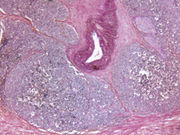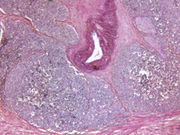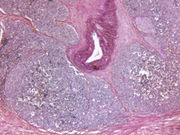Tag: Cancer: Prostate
Second Opinions Seldom Change Prostate Cancer Decisions
Most patients choose treatment they originally planned to follow
Differences in Risk Factor Estimates for Prostate Cancer
Across cohorts of men undergoing screening, considerable variation in risk factor estimates
Higher Grade Disease at Prostatectomy With Surveillance
No difference in other adverse pathological outcomes versus men undergoing immediate surgery
Surveillance Rates on Rise in Low-Risk Prostate Cancer
In Sweden, 90 percent with very low-risk disease choose this option instead of immediate treatment
Androgen Deprivation Therapy May Raise Dementia Risk
Men on ADT found to have twice the risk of developing dementia within five years of treatment
Snus Use Tied to Higher Risk of Prostate Cancer Mortality
Safety of the smokeless tobacco product called into question
ASTRO: No Survival Benefit for Adding EBT to Brachytherapy
Addition of external beam therapy doesn't improve five-year progression-free survival in prostate cancer
Drop in Use of Digital Rectal Examination, PSA Testing
Decreases in use of screening following USPSTF recommendations against routine PSA screening
No Link Found Between Vasectomy, Prostate Cancer Risk
Large study challenges previous research linking the procedure to slightly higher chance of disease
Testosterone Seems Safe for Hypogonadal Prostate CA Patients
Testosterone therapy seems oncologically safe after treatment or for those on active surveillance














